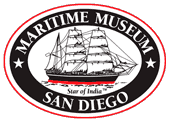Disabled Visitors Practice and Policy Guide
Revised June 27, 2022
In compliance with the “Americans With Disabilities Act” the Maritime Museum will do everything safely possible to accommodate visitors with disabilities.
Much of the Museum is readily accessible to visitors in wheelchairs. Wheelchair access to the Berkeley McKinney Deck is provided via the lift at the forward end of the vessel, starboard side.
Other portions of the historic vessels are accessible with staff assistance, depending on the nature of the disability as well as current weather and sea state conditions which might make such access problematic. Visitors requiring staff assistance for access should notify the Museum in advance to ensure adequate staff is present to assist.
Due to their period construction some parts of the Museum and some of the vessels may not be safely accessible to visitors in wheelchairs, even with staff assistance. Because of this, the Museum will grant free admission to visitors in wheelchairs.
Visitors wishing to embark on one of the Museum’s historic vessels for under way operations must be able to don a US Coast Guard approved personal flotation device. Because of the vessel’s physical nature, PCF 816 is not practical for visitors with wheelchairs to embark.
Pilot was rebuilt in such a way as to make the vessel accessible to visitors in wheelchairs, provided that their wheelchairs are narrow enough or the visitor is willing to use the Museum’s wheelchair for the trip. Access to the Pilot from the Berkeley port side gangway and Medea is, however, problematic. Visitors in wheelchairs can be accommodated on board the Pilot, however, from the floating dock, Berkeley starboard side, with advance notice. Maritime Museum employees will identify persons with physical disabilities and extend priority boarding to them.
Please feel free to contact 619-234-9153 Ext 129 or Ext 116
